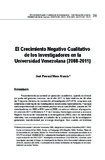Mostrar el registro sencillo del ítem
El Crecimiento Negativo Cualitativo de los Investigadores en la Universidad Venezolana (2008-2011)
| dc.rights.license | http://creativecommons.org/licenses/by-nc-sa/3.0/ve/ | |
| dc.contributor.author | Mora García, José Pascual | |
| dc.date.accessioned | 2015-02-25T14:13:12Z | |
| dc.date.available | 2015-02-25T14:13:12Z | |
| dc.date.issued | 2012-05 | |
| dc.identifier.issn | 0798-3069 | |
| dc.identifier.uri | http://www.saber.ula.ve/handle/123456789/39822 | |
| dc.description.abstract | Recientemente se cometió un genocidio académico, cuando se eliminó por parte del gobierno nacional en el año 2011 la data histórica de 20 años del Programa Sistema de promoción al Investigador (SPI-PPI), programa que establecía el ranking de los investigadores reconocidos nacionalmente. Y aunque había experimentado un crecimiento positivo en sus casi 20 años, pasado de 741 investigadores en 1990 a 6791 para el 2009, se opto por eliminar el programa. En enero de 2011 el Ministerio P. P. de Ciencia y Tecnología convocó a un nuevo Registro Nacional de Innovadores e Investigadores (RNII), pero los resultados obtenidos han menoscabado la tradición de la evaluación de la investigación generando inconformidad por el sesgo ideológico. Aun cuando en términos cuantitativos pareciera que hay un crecimiento al incorporar los llamados innovadores el nuevo Programa de Estímulo a la Innovación e Investigación(PEII), no se presentó las estadísticas de quiénes no aplicaron al programa y que estaban clasificados en los más altos niveles del SPI-PPI. Pues el nuevo sistema sólo convalidó a los investigadores eméritos. Lo cierto es que hay un crecimiento negativo en lo cualitativo si tomamos en cuenta que una tercera parte de los anteriormente clasificados no aplicaron al PEII, además de una campaña de infravaloración hacia los investigadores destacados, que ven cada vez más menguadas las posibilidades de hacer investigación de punta en nuestras universidades, por las reducciones presupuestarias y limitaciones en las políticas de financiamiento de los programas de los Consejo de Desarrollo Científico Humanístico Tecnológico y de las Artes (CDCHTA). Aunque la ciencia no es neutra (Feyerabend) era conveniente que se incluyera un equipo de evaluadores heterodoxo ideológicamente para darle mayor credibilidad al programa. | es_VE |
| dc.language.iso | es | es_VE |
| dc.rights | info:eu-repo/semantics/openAccess | |
| dc.subject | Investigación | es_VE |
| dc.subject | Universidad | es_VE |
| dc.subject | Crecimiento negativo | es_VE |
| dc.title | El Crecimiento Negativo Cualitativo de los Investigadores en la Universidad Venezolana (2008-2011) | es_VE |
| dc.title.alternative | Qualitative Negative Growth of Researchers at the Venezuela University (2008-2011) | es_VE |
| dc.type | info:eu-repo/semantics/article | |
| dc.description.abstract1 | Recently an academic genocide committed when removed from the national government in 2011 the 20-year historical data System Promotion Program Investigator (SPI- PPI) program established ranking nationally recognized researchers. And although he had experienced positive growth in nearly 20 years, after 741 researchers in 1990-6791 for 2009, it was decided to remove the program. In January 2011 the PP Ministry of Science and Technology convened a new National Register of Innovative and Researchers (RNII), but the results have undermined the tradition of research evaluation generating disagreement with the ideological bias. Although quantitatively seems that there is a growth by incorporating innovative called the new Stimulus Program for Innovation and Research ( PEII ), no statistics of who was presented did not apply to the program and were ranked the highest levels of SPI- PPI. As the new system only validated the researchers emeritus. The truth is that there is a negative growth qualitatively if we take into account that a third of the previously classified not apply to PEII, plus a campaign towards underestimation leading researchers, who are increasingly dwindling chances of doing research tip in our universities, by budget reductions and limitations on political funding programs of the Council for Scientific and Technological Development Humanistic Arts (CDCHTA). Although science is not neutral (Feyerabend) was appropriate that a team of evaluators included ideologically heterodox to give greater credibility to the program. | es_VE |
| dc.description.colacion | 255-273 | es_VE |
| dc.description.email | pascualmora@cantv.net | es_VE |
| dc.description.frecuencia | trimestral | |
| dc.publisher.pais | Venezuela | es_VE |
| dc.subject.centroinvestigacion | Centro de Investigaciones en Ciencias Humanas (HUMANIC) | |
| dc.subject.facultad | Facultad de Humanidades y Educación | es_VE |
| dc.subject.institucion | Universidad de Los Andes | es_VE |
| dc.subject.keywords | Research | es_VE |
| dc.subject.keywords | University | es_VE |
| dc.subject.keywords | Negative growth | es_VE |
| dc.subject.publicacionelectronica | Revista Fermentum | |
| dc.subject.seccion | Revista Fermentum: Artículos | es_VE |
| dc.subject.thematiccategory | Artes y Humanidades | es_VE |
| dc.subject.tipo | Revistas | es_VE |
| dc.type.media | Texto | es_VE |
Ficheros en el ítem
Este ítem aparece en la(s) siguiente(s) colección(ones)
-
Fermentum - Año 022 - Nº 64
mayo - agosto 2012


